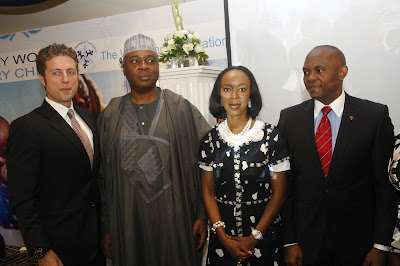Healthcare: Businesses task government on more funding, others
When one considers the fact that Nigeria is touted as the giant of Africa, the average national maternal mortality ratio at 1,100 deaths per 100,000 live births, and the lifetime risk of maternal death at 1 in 18 have become damning, if not thought-provoking as revealed by the United Nations (UN).
When viewed in global terms, the burden of maternal death is brought into stark reality: approximately 1 in every 9 maternal deaths occurs in Nigeria alone. The women, who survive pregnancy and childbirth, may face compromised health even as studies suggest that between 100,000 to 1 million Nigerian women may be suffering from obstetric fistula.
With just four years left to achieve the Millennium Development Goals (MDGs), government has been tasked to prioritise national health plans, allocate more funding to the sector and ensure that resources are used effectively as well as encourage all stakeholders (healthcare organisations, private sector and donors) to partner and harmonise their efforts with government to improve the conditions of women and children in Nigeria.
Speaking at the formal presentation of the United Nation’s ‘Every Woman, Every Child Initiative in Nigeria’ with partners and stakeholders in Lagos, Stephen Sobhani, director of Private Sector Engagement, United Nations Foundation, revealed that about 8 million children die of preventable causes and more than 350, 000 die from preventable complications related to pregnancy and childbirth.
While noting that world leaders agreed on a set of target- the MDG- a blueprint to improve the wellbeing of the world’s most vulnerable people over a decade ago, Sobhani stated that there has been great headway in attainting the MGD targets in many countries, but, he noted that there is a glaring gap on women’s and children’s heath.
Sobhani also noted that reaching the targets for MDG 4(a two-thirds reduction in under-five mortality) and MDG 5 (a three-quarters reduction in maternal mortality and universal access to reproductive health) would mean saving the lives of 4 million children and about 190, 000 women in 2015 alone.
“Women and children play a crucial role in development. Investing in women and children’s health is not the right thing to do; it also builds stable, peaceful and productive societies. However, increasing investment has many benefits; it reduces poverty, helps women and children realise their fundamental human rights as well as stimulate economic productivity and growth. However, women and children need an integrated package of essential interventions and services delivered by functioning health systems.
“Every country needs to invest more in health to meet the MDGs. Many low-and middle-income countries can and are increasing their investment to cover their own needs, supported by external assistance where required. However, these countries should also forge partnerships with each other that will promote the exchange of technical expertise and cost-effective interventions,” Sobhani stated.
Lending her view, Toyin Saraki, founder, The WellBeing Foundation, noted that private and public sector-partnerships remain the only option to produce a Nigerian-led, Nigerian-managed, Africa-focused, Africa-impact, private sector-driven grant fund and impact investment profile to deliver on the MDGs to its citizenry.
Saraki, former wife of Kwara State, who has been appointed by the United Nations Foundation to lead the initiative in Nigeria and Africa, described the “Every Woman Every Child Initiative” as the bridge between private and public sectors’ efforts at fulfilling the United Nations’ aspirations for women and children of the world.
According to her, “The private sector must revise its role in the development of the country, applying the already established foundations of information, efficiency and timeliness. It is only with your support that we can make this happen, and develop the vision into something larger than ourselves. Having worked for the improved health of women and children through The Wellbeing Foundation in the decade, during which I have been privileged to raise a national alarm on the situation of women and children and the need for an integrated approach to the issues, there is the need for all stakeholders to come together and harness all their resources for greater impact.”



Comments
Post a Comment